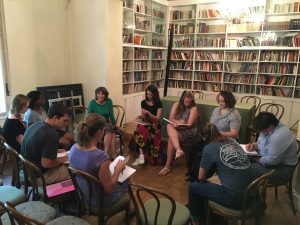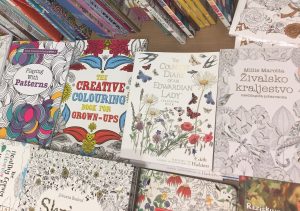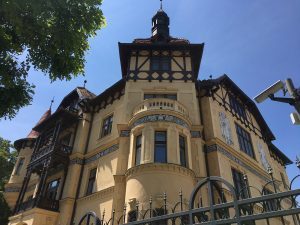Some of the most interesting conversations take place off to the side, with only a handful of people. There are people on this very abroad who weren’t able to hear about Slovene fairy tales from a tenured Slovenian poet. Let’s fix that now!
 Ifigenija Simonović is a modernist poet, no rhymes no rules, as well as the president of the Slovene branch of PEN, an organization that defends the rights of writers worldwide. You might say it’s like amnesty international but for poets, essayists, novelists, and writers of all kinds. She encouraged us to gather the chairs in the cozy lecture hall of the Slovene Writers Association into a big circle. It made us feel more comfortable with asking questions as she took us through a wandering chat about everything from Slovene literary history to the rash of foreign coloring books that have swept through the nation just as forcefully as in the United States.
Ifigenija Simonović is a modernist poet, no rhymes no rules, as well as the president of the Slovene branch of PEN, an organization that defends the rights of writers worldwide. You might say it’s like amnesty international but for poets, essayists, novelists, and writers of all kinds. She encouraged us to gather the chairs in the cozy lecture hall of the Slovene Writers Association into a big circle. It made us feel more comfortable with asking questions as she took us through a wandering chat about everything from Slovene literary history to the rash of foreign coloring books that have swept through the nation just as forcefully as in the United States. 
After making a halting trip to the orange juice station at the back of the room, having stopped to chat briefly with everyone on the way there, she settled in for a series of bonus questions while we waited for our next lecturers (two translators) to arrive.
Jolee started the bonus round by asking if there were any domestic fairy tales. Ifigenija explained that Slovenia’s cultural and geographical landscape had given them access to the same Brothers Grimm tales we associate with Europe at large. Most original tales are either in a different format, like regional folk songs, or are so saturated with sad weight that we might not recognize them as common bedside tales. The most striking example were stories of infanticide. Constantly conquered by warring tribes and falling more than once into ethnic cleansing, this region has received a lot of attention regarding what to do in the aftermath of unwanted attentions.
This came as a bit of a shock to us, as we’d never heard such tales mentioned, which led Ifigenija to explain one of the most counterintuitive factoids about Slovene writers: some of them don’t want to be found. Translating is all well and good for the sake of Slovenian descendants in distant lands who have lost their mother tongue, but there’s not much point to trying to please the uncaring foreigner, she said; and besides, “Why should we share everything? We can’t! Let us have our treasures.”
Ifigenija is certainly a treasure, and I know her comments about the financial and physical dangers of writing in adverse times and places will bounce around in my head long after we return to the States.
 Speaking of the States, we can’t help showing a picture of the U.S. Embassy, a neighbor to the Slovene Writers’ Association.
Speaking of the States, we can’t help showing a picture of the U.S. Embassy, a neighbor to the Slovene Writers’ Association.
~Devon
Devon Izmirian is a mass communication major who was so excited about Slovenia and Croatia that she delayed graduating until the end of the summer. She researched the sleepy province of Prekmurje to present to the class, and she will be interning as an audio editor with JSH-Online this summer.

